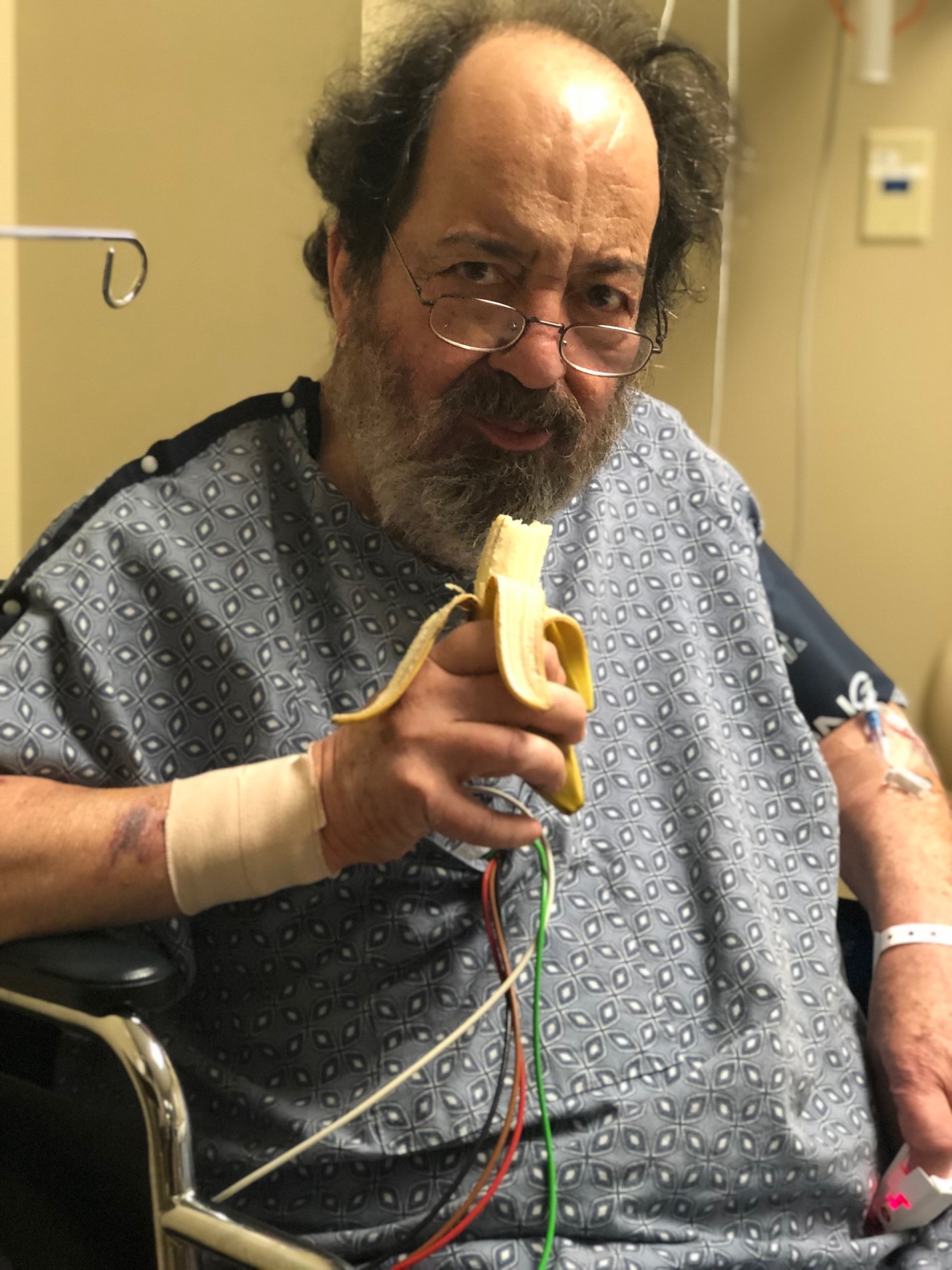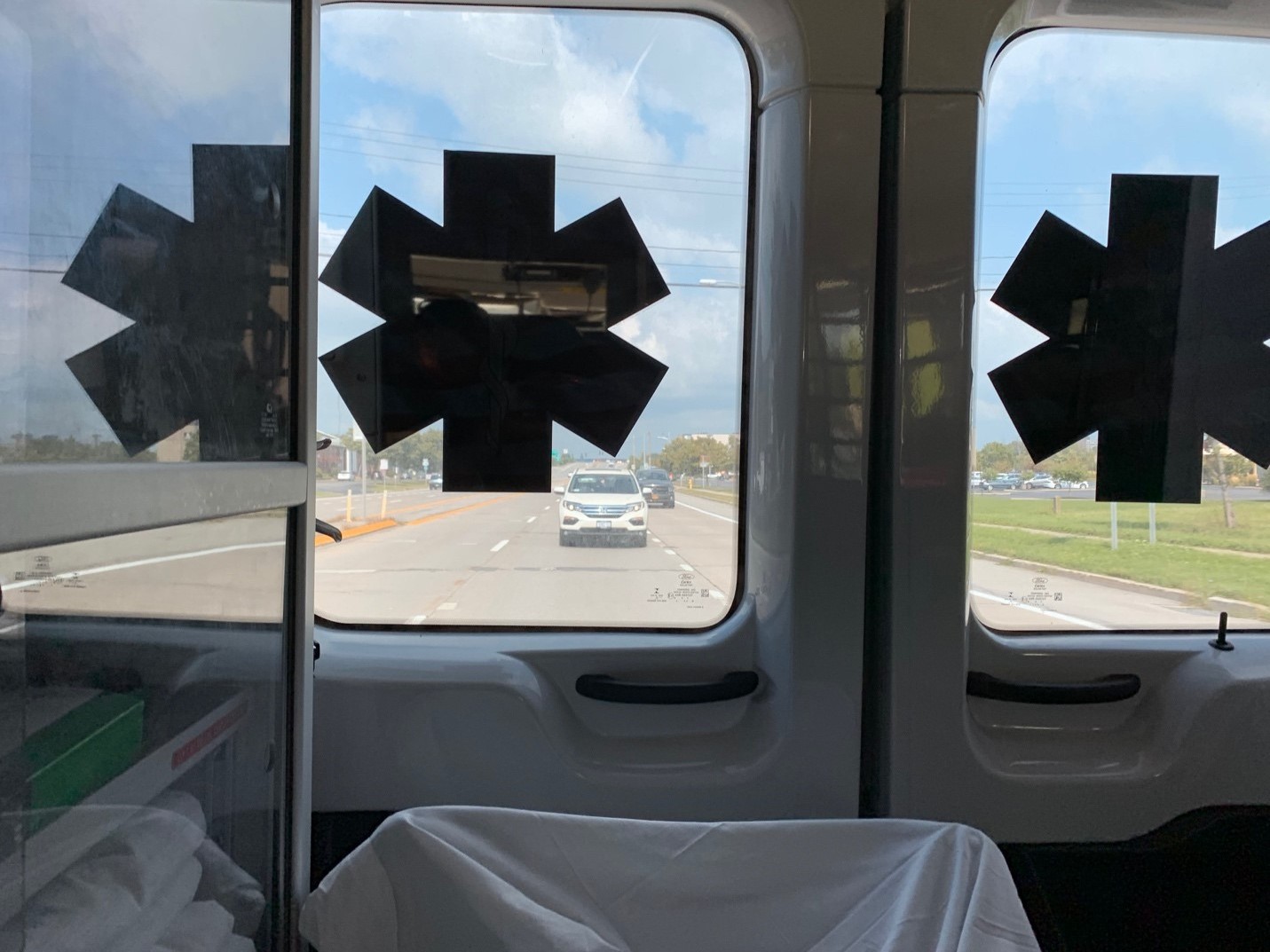
Thursday, September 12, 2019
I’ll begin at the end: I’m now in almost-infinitely better physical shape than I was a few days ago. And between then and now, nothing hurt.
Last Saturday, September 9, I was in Philadelphia for a Wooster Group performance of The B-Side, their play based on some of my early work. In the Philadelphia airport Sunday, I had to stop frequently because of discomfort behind my sternum. When I sat down, the discomfort went away; when I walked fifty yards, it came back. I’d had a few such episodes earlier, which my internist thought was probably acid reflux. He’s a careful guy, so he so he sent me to a cardiologist for a workup, just to be sure.
She said, “It may be reflux, but you’ve got a lot of risk factors.” One of the key factors is that my father’s side of the family had a terrible coronary history: none of them lived close to my age (I’m 83), and several didn’t make it past 40. She scheduled me for an ordinary echo stress text yesterday, September 11.
Sunday, when I got home from Philadelphia, I wrote both doctors a note describing what happened in the airport. They both called the next morning, expressing concern. The cardiologist said she was going to do the echo stress test anyway, but she was also going to send me for an angiogram, maybe in a few days, maybe immediately, depending on what the stress test revealed.
Tuesday night, Diane Christian and I did our usual session of Buffalo Film Seminars at the Dipson Amherst Theater. It’s a weekly film series we’ve been running for 20 years. Each week, we spend maybe 20 minutes introducing the film; it screens; then we have an open discussion. That night’s film was Preston Sturges’s Unfaithfully Yours. Everything went fine except, halfway thought our introduction to the film, I couldn’t remember Sturges’s name. Diane had to remind me. Afterwards, she said, “You’re under some stress.” I hadn’t thought I was, but I was. I had a pretty good notion of how Wednesday was going to end up.
They did the resting echo cardiogram. Then I got up on the treadmill, Surprisingly, I had no discomfort at all; I completed the routine only mildly out of breath, which was normal for the pace and elevation we reached. The post-exercise cardiogram, however, was lousy. I don’t know what she saw, but she didn’t like it. “Your heart’s perfectly sound, but… I’m sending you for an angiogram right now,” she said.
That’s what I’d suspected that might happen, so I had a charger for my iPhone and a Kindle in my shoulder bag. Diane and I got ready to go to the car.
“He’s going in an ambulance,” the cardiologist said. Diane asked why. “Because he might have a heart attack on the way,” the cardiologist said. She stepped out of the room for a moment. She returned and said, “They’ll be waiting for you at the hospital.”
When they put me in the ambulance, I said to the driver, “My wife’s going to be following us in a white Honda Pilot.” He said he’d take care not to lose her. On the way to the hospital, I took some iPhone photos of Diane following us.

The hospital had me in a room immediately on arrival. Most of the people in the rooms we passed getting to my room looked to be in very scary condition. Maybe five or ten minutes after I was settled in (that means, attired in that absurd open-backed gown), the surgeon came into my room. We chatted and she told me what she was going to do. “If we can fix it here, we will. If we can’t, we’ll do something else.” I asked when she was going to do it. “Now,” she said.
She gave me some numbers I remember only vaguely. I think she said the procedure was pretty safe, but there was a one in 300 chance of something going awry. And there was a one in 100 chance of infection afterwards. At first, I thought those were great odds, then it occurred to me that the possible consequence of being on the wrong end of those odds was death.
They had me on a gurney as soon as he surgeon left the room. As they were wheeling me into the operating room, the nurse pushing the gurney said, “Would you two like a last kiss before we go in?”
Diane said, “We already did that, but sure.”
I said, “How about a blowjob?”
The nurse made a slight gurgling noise in her throat that was either suppressed laughter or horror. As we moved along, I thought, “It would have been wittier to have said, in a British accent, ‘I suppose a blowjob is out of the question,’” but there was no way to revise: you can revise a written text before you send it, but words uttered are out there. (Hi-ho, Rudy Giuliani.)
I was thinking such foolishness when they hit my drip tube with stuff that, as an old folksong had it, “drove dull care away.” I never had time to get anxious.
The only things I felt were the brief prick of the needle with the stuff numbing my wrist (they went in through the radial artery) and a not-painful sensation of the catheter going through my bicep. I said, “Are you in my bicep?”
The surgeon said, “Is it hurting?”
I said, “No, I’m just curious.”
That wasn’t significant enough to rate a response. She bent back to her work. A few seconds later, I was about to ask, “Are you in?” but I saw on the monitor what was obviously a beating heart. She was in.
The pumped in the dye to light up the arteries. There was, she told me, only a single compromised artery, one of those feeding the right coronary artery, which is located exactly where I’d felt the chest discomfort in Philadelphia.
They inserted a stent, and that was it. After a while, the surgeon said, “Somebody get me some other shoes. I don’t want to track the floor up with all this blood.” I understood why they had a partial curtain blocking my field of view on the side where they’d been working.
While they were getting ready to put me on the cart to take me back to the room, a nurse showed me before and after pictures. The felonious artery had been 90% blocked. I really was dangerously close to something depressing: a heart attack or a stroke. But now, that is completely fixed and I know none of the other arteries is compromised, which is very good news indeed. Something is going to get me, but the CV system lost its opportunity.
I’d been out of my room no more than 90 minutes. The entire process, from arrival at the cardiologist’s for the stress test to being back in my hospital room bed took four hours and ten minutes!
They kept me there overnight for monitoring, then set me free about 10:30 Thursday morning. I had been out of the house 22 hours. We got home a little after 11 A.M. After we let the dog out, I said, “I’m going to have a martini.”
Diane said, “Do you think it’s safe to have a martini?”
“Nothing here”—I pointed at the pile of instructions they’d given me at the hospital—“says to avoid them.”
“Isn’t it a little early for a martini?” she said.
“Not today, it isn’t,” I said. She had one, too. Then I took a nap. Then I got up and went back to work.
I felt, and continue to feel perfectly fine. There’s no recovery period from this. It’s sort of like a root canal, only easier (because the dope is far better): you go in with a problem; you come out without the problem; whatever discomfort got you there is totally gone.
The only traces indicating something had transpired were two bruises: one on my left arm, where the drip had gone in; the other on my right wrist, just above the insertion point. The day after the surgery, the bruise on my wrist had the shape of four fingers, just like one of those strangulation victim photos on TV. One of the nurses had, obviously, manually clamped my radial artery for a while. Both bruises were gone in a few days.
The operation was done at Mercy Hospital of Buffalo. It’s not one of the city’s major hospitals. If major work had to be done, I’d have been moved to Cleveland Clinic, if there was time, or to Kaleida Health, if there wasn’t. But the cardiologist knew that the staff there could handle this phase of it perfectly well, that they’d take care of me immediately, and that once out of the OR they would be constantly careful, solicitous, and friendly. The three or four times I pushed the button, someone was in the room within one minute.
The only time I had to wait for anything was getting to the car. The physician’s assistant on duty said Diane couldn’t wheel me to the parking lot; we had to wait for someone she referred to as “The Transporter.” (I thought of “The Cleaner” in Pulp Fiction.) He didn’t come for a while so we tried to sneak off, but she caught us. When he did come, he took a far more circuitous route to the parking garage than Diane had taken coming in. “It’s raining out now,” he said. “If we go the way you came, you’ll get wet.” We had to wait a long time for the parking attendant to bring the car up. I asked the Transporter if he could break a $20 bill. He said he couldn’t, so I gave him the twenty. He’d spent a lot of time with us, and he’d told us good stories along the way and while we’d waited for the car. He refused it. “That’s entirely too much for something like this,” he said. Buffalo is like that.
So: I got rid of something that might have killed me; I learned that my CV system is (now) in very good shape; I got the incentive I needed to get me back on my exercise routine; and, as I said, nothing hurt.
A happy story, but consider one thing: I work for a university and I have a very good health plan. Other than a $25 co-pay at the cardiologist and $5 for a three-month supply of the blood-thinner I have to take for a year, this didn’t cost me a dime. What if I’d been one of the millions of Americans without a health plan? Would I have gotten to write, and you have gotten to read, this report?